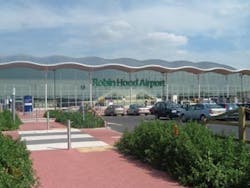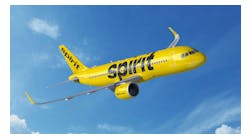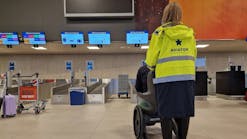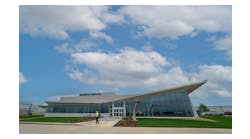The UK’s first full service airport for more than 30 years, Robin Hood Airport Doncaster Sheffield (DSA) began operations on April 28, 2005. Built on a former Royal Air Force site, the facility is located in a previously underserved region of South Yorkshire and will provide much-needed aviation services to major northern UK cities, such as Sheffield, Doncaster and Lincoln.
The gateway has one of the longest runways in Northern England and is capable of handling all types of service, including long-haul and freight. Robin Hood expects more than one million passengers in its first year and has the capacity to handle double that number, as well as over 50,000 tons of freight.
The airport is the property of Peel Holdings, which also owns Liverpool John Lennon Airport and has a 75 percent shareholding in Durham Tees Valley Airport (formerly Teesside). It is because of successful operations at these facilities — as well as its other, extensive experience — that Servisair/GlobeGround managed to beat off six other competitors to land a contract as preferred supplier of ground handling services at Robin Hood Airport. Notes Robin Hood Airport’s Managing Director David Ryall, “Safe and efficient ground handling is an essential component of any airport.”
Servisair/GlobeGround also operates at the group’s other airports of Liverpool John Lennon and Durham Tees Valley and we are building on an already strong relationship with the company at Robin Hood Airport.”
Training key
Servisair/GlobeGround was merged in 2001 following the acquisition of GlobeGround by the French group Penauille PolyServices, which had previously purchased Servisair in early 1999. It has more than 20,000 employees serving the needs of some 700 customers.
At Robin Hood, the company has been awarded a seven-year contract to provide passenger handling, ramp and baggage handling and technical services. It will invest approximately £1.6 million (US$3 million) in brand new ground service equipment and training.
According to Bernard Farrell, Servisair/GlobeGround regional vice president, Ground Handling UK & Ireland, it is the training rather than infrastructure and equipment that holds the key to a successful tenure at a new airport.
“Robin Hood is brand a new airport and that means it is an exciting opportunity — it’s like an artist with a blank canvas,” he enthuses. “We have a great relationship with Peel Holdings and that gave us the chance to get in early and optimize the ground services.”
“But it’s not just about getting the equipment and infrastructure right,” he continues. “Of course it helps to have the opportunity to sort out processes and it means we can work a lot smarter — but the biggest benefit is adding value to jobs.”
A brand new airport means brand new people. A team of 85 has been recruited and underwent rigorous training, including spells at Servisair/GlobeGround’s other operations.
“It means we have utilized our training to get everything right from day one,” Farrell notes. “We have brought in new, quality people. Management and staff have been able to start with an excellent two-way dialogue and we now have engaged employees using modern equipment and the latest processes. You don’t get that chance in established airports where staff have been working for a number of years.”
Bricks and mortar are still an important part of the equation and Robin Hood has employed the latest construction methods and space utilization techniques. For example, the check-in area has benefited from an ergonomic design, which makes it a perfect fit for employee operations and provides a logical flow for the passenger.
There is always a slight risk of going into the unknown and even with Servisair/GlobeGround’s vast experience — it serves nearly 150 locations worldwide, spanning 31 countries in four continents — nothing was left to chance. A start-up team consisting of experienced management and functional staff ensured a smooth commencement of operations.
“We had a multi-disciplinary task force working at Robin Hood for some time and they were working to a very strict agenda,” agrees Farrell. “We brought in expertise from all aspects of the business — not just operations but also back-end functions such as Human Resources. Everybody necessary was there to advise. It was all very carefully managed.
“We also had pilot runs of all our activities,” he adds. “From check-in to baggage make-up to ramp handling, everything was tested repeatedly.”
Knowing the market
There will be some old friends for Servisair/GlobeGround at Robin Hood. Although the airport will initially be led by Thomsonfly.com, which will base its Boeing fleet at the airport to serve a newly combined low-cost and charter business, other carriers include low-cost heavyweight Ryanair.
Much of the Irish carrier’s UK ground handling work is already done by Servisair/GlobeGround. Indeed, a multi-year contract between the two was recently renewed and covers 13 airports across the UK, including Robin Hood.
Ryanair serves more than 27 million scheduled passengers across 19 countries, operating mainly Boeing 737-800s and orders for up to 140 new aircraft will allow Ryanair to continue on its planned double-digit growth strategy. From Robin Hood Ryanair will fly a direct daily route to Dublin, which it hopes will carry over 70,000 passengers per annum.
“We have had tremendous success in the low-cost sector,” admits Farrell. “Apart from handling Ryanair at the majority of their UK destinations, we also handle them in Ireland, at Shannon and Cork.” Other Servisair/GlobeGround low-cost contracts include easyJet at a number of locations throughout the UK and Europe, Air Berlin at Stansted and Manchester and Thomsonfly at Bournemouth.
Vital flexibility
Being a large organization Servisair/GlobeGround is equally adept at working for major carriers. Clients range from Emirates, Continental and Delta Air Lines at London Gatwick to Singapore and Malaysia Airlines at Manchester. Such flexibility is vital to keep ahead of the curve according to Farrell but that doesn’t mean the company is growing on an ad-hoc basis. Like the Robin Hood contract win, all of its marketing endeavours are very carefully controlled.
“The market in the UK and Ireland is in a state of continuous change right now,” Farrell assesses. “The recent oil price hikes are just the latest example of an extremely fluid market.”
“Despite this state of flux — or perhaps because of it — we have been very careful in selecting our clients,” he comments. “We want to handle certain types of aircraft at certain airports. It’s certainly not a case of one size fits all. Quite simply, some airports are better suited for certain types of aircraft.”
In order to maintain a sustainable business model, Servisair/GlobeGround needs to balance the resources at hand with airline requirements. It calls for shrewd judgement and a very efficient business model. Service quality, profit and resources have to be balanced delicately enough to inspire a winning formula for ground handler and customer alike.
“We’re carefully selecting which customers we want to win,” explains Farrell, “because we don’t want to buy market share. We need to work out the revenue-cost equation and make sure we have sustainable business. We want to grow and add value for our shareholders. However, we have handled every aircraft type and with very robust processes in place, we can plan and handle any type of service agreement or level an airline might require.”
Servisair/GlobeGround uses sophisticated tools and methodology to determine its prices. It needs to be high-tech because the market is extremely competitive and new entrants are continually coming in with a blank sheet of paper, allowing rock-bottom prices. An established global brand such as Servisair/GlobeGround doesn’t have that luxury.
“Lots of airlines buy at the lowest price but we will always concentrate on the quality of service,” says Farrell. To try and win airline clients to this point of view, Servisair/GlobeGround prefers operating on a ‘penalties and rewards’ type of contract. If service levels drop or there are problems within the company’s control then it loses money. However, if it exceeds service level targets, then it receives a bonus.
“The airlines are very happy with this — the costs of service failure usually outweigh the savings of the lowest price — it’s a classic ‘win-win’ situation,” Farrell concludes.





